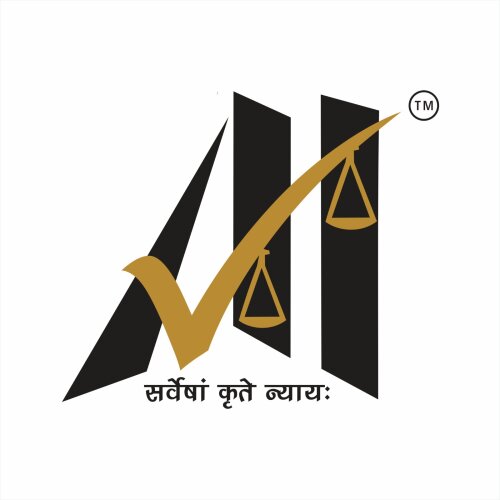Best Accounting & Auditing Lawyers in Jaipur
Share your needs with us, get contacted by law firms.
Free. Takes 2 min.
List of the best lawyers in Jaipur, India
About Accounting & Auditing Law in Jaipur, India
Accounting and auditing laws in Jaipur, India, are designed to establish standards and procedures for financial record-keeping and the evaluation of financial statements. This ensures accountability, transparency, and accuracy in financial reporting and compliance with statutes and regulations. Jaipur, being a significant hub of business activities in Rajasthan, has a well-developed legal infrastructure to support businesses in adhering to accounting and auditing standards as mandated by Indian laws, such as the Companies Act, 2013, and various standards prescribed by the Institute of Chartered Accountants of India (ICAI).
Why You May Need a Lawyer
There are several scenarios where legal assistance in the field of accounting and auditing might be necessary. These include:
- Financial Discrepancies: Identifying and addressing fraudulent activities or errors in financial statements.
- Corporate Compliance: Ensuring that businesses comply with national and local laws regarding financial reporting.
- Tax Issues: Navigating complex tax laws and resolving disputes with tax authorities.
- Auditing Disputes: Addressing conflicts or disputes arising from audit findings.
- Mergers and Acquisitions: Conducting due diligence and ensuring proper financial disclosure during corporate restructuring.
- Litigation Support: Providing expert testimony and legal support in cases involving financial mismanagement or fraud.
- Regulatory Filings: Assisting in the preparation and submission of mandatory financial filings and reports.
Local Laws Overview
Key aspects of local laws in Jaipur, India, relevant to accounting and auditing include:
- Companies Act, 2013: Governs the establishment, operation, and audit of companies, ensuring accurate financial reporting and adherence to statutory requirements.
- Income Tax Act, 1961: Specifies guidelines for income tax computation, payments, and audit requirements for individuals and businesses.
- Goods and Services Tax (GST) Act, 2017: Mandates the audit and filing of GST returns for businesses exceeding certain turnover limits.
- ICAI Standards: Prescribes standards for accounting and auditing practices, ensuring consistency and reliability of financial information.
- Internal Financial Controls: Businesses are required to establish internal financial controls as part of their financial management and reporting processes.
Frequently Asked Questions
1. What is the role of an auditor?
An auditor reviews financial statements and records to ensure accuracy, compliance with regulations, and identifies any discrepancies or fraudulent activities.
2. When is an audit mandatory for companies in Jaipur?
Audits are mandatory for all companies registered under the Companies Act, 2013, including private limited companies, public limited companies, and limited liability partnerships (LLPs).
3. How can a lawyer assist in tax-related issues?
A lawyer specialized in tax law can help with tax planning, resolving disputes with tax authorities, and ensuring compliance with tax regulations to avoid penalties and legal issues.
4. What are the penalties for non-compliance with accounting standards?
Penalties for non-compliance can include fines, imprisonment of responsible individuals, disqualification of company directors, and additional scrutiny or sanctions by regulatory authorities.
5. What is forensic accounting?
Forensic accounting involves the use of accounting, auditing, and investigative skills to examine financial records for potential fraud, embezzlement, or other financial crimes.
6. Can a lawyer help in setting up internal financial controls?
Yes, lawyers can advise on the establishment of internal financial controls to ensure compliance with legal requirements and to mitigate risks associated with financial management.
7. What documents are needed for an audit?
Documents typically needed for an audit include financial statements, bank statements, invoices, receipts, tax returns, and internal financial records.
8. How often should audits be conducted?
Audits are generally conducted annually, but the frequency may vary depending on the regulatory requirements and the specific needs of the business.
9. What is the significance of GST audits?
GST audits ensure that businesses comply with GST regulations, accurately report their sales and purchases, and correctly calculate the tax owed to the government.
10. How can I find a qualified accounting and auditing lawyer in Jaipur?
You can find qualified professionals by consulting the local Bar Association, checking with professional bodies like the ICAI, or seeking referrals from other businesses or professionals.
Additional Resources
Here are some useful resources and organizations related to accounting and auditing:
- Institute of Chartered Accountants of India (ICAI): The national professional accounting body in India.
- Ministry of Corporate Affairs (MCA): Governs corporate laws in India, including accounting and auditing regulations.
- Income Tax Department, India: Oversees the enforcement of tax laws and collection of direct taxes.
- Goods and Services Tax Network (GSTN): Provides IT infrastructure and services to stakeholders for the implementation of GST.
- Rajasthan Tax Board: Handles disputes related to state taxes in Rajasthan.
Next Steps
If you need legal assistance in accounting and auditing, consider the following steps:
- Identify Your Needs: Determine the specific accounting or auditing issues you need help with.
- Research Qualified Professionals: Look for lawyers or law firms with expertise in accounting and auditing law.
- Consult Professionals: Schedule consultations with potential lawyers to discuss your case and understand their approach.
- Review Credentials: Check the qualifications, experience, and track record of the professionals you consider hiring.
- Seek Referrals: Ask for recommendations from other businesses or professionals who have faced similar issues.
- Clarify Fees: Ensure you understand the fee structure and any additional costs involved.
- Engage the Lawyer: Once you find a suitable lawyer, formally engage their services to address your accounting and auditing needs.
Lawzana helps you find the best lawyers and law firms in Jaipur through a curated and pre-screened list of qualified legal professionals. Our platform offers rankings and detailed profiles of attorneys and law firms, allowing you to compare based on practice areas, including Accounting & Auditing, experience, and client feedback.
Each profile includes a description of the firm's areas of practice, client reviews, team members and partners, year of establishment, spoken languages, office locations, contact information, social media presence, and any published articles or resources. Most firms on our platform speak English and are experienced in both local and international legal matters.
Get a quote from top-rated law firms in Jaipur, India — quickly, securely, and without unnecessary hassle.
Disclaimer:
The information provided on this page is for general informational purposes only and does not constitute legal advice. While we strive to ensure the accuracy and relevance of the content, legal information may change over time, and interpretations of the law can vary. You should always consult with a qualified legal professional for advice specific to your situation.
We disclaim all liability for actions taken or not taken based on the content of this page. If you believe any information is incorrect or outdated, please contact us, and we will review and update it where appropriate.













